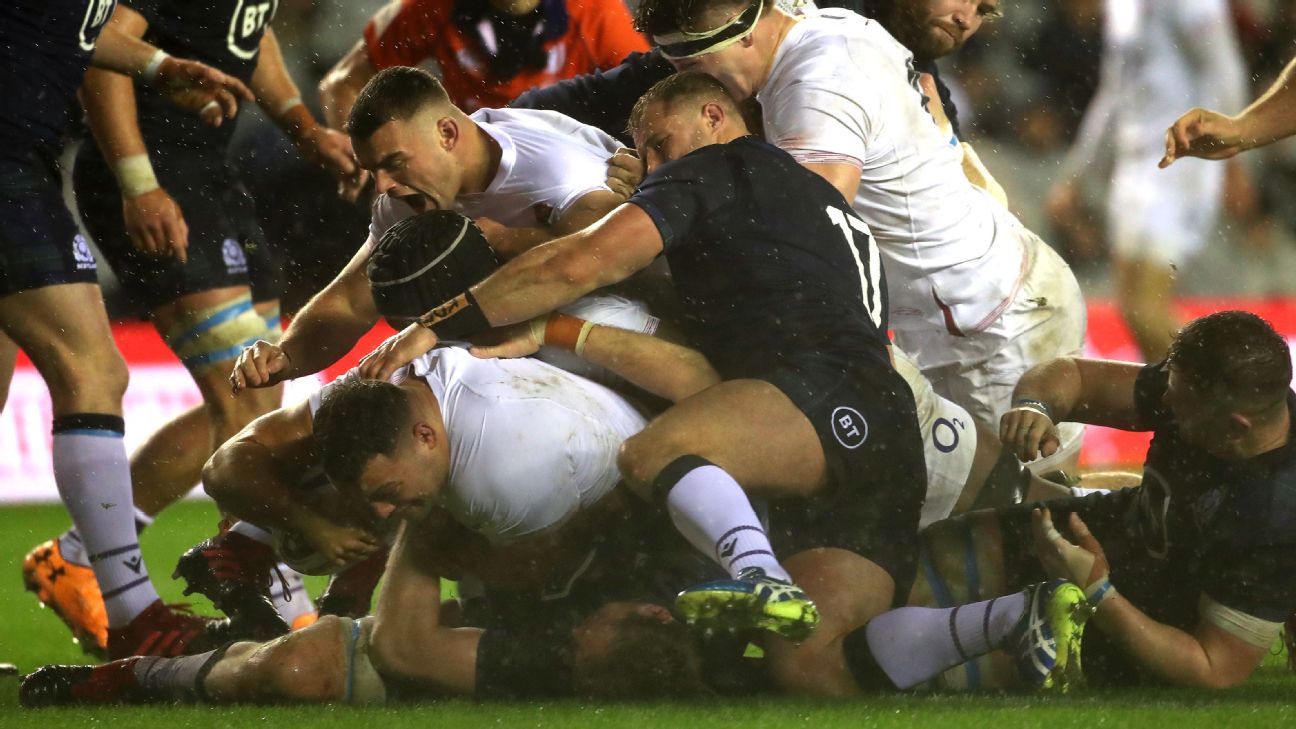EDINBURGH, Scotland — Only Ellis Genge knows what was going through his mind as he patrolled England’s technical area waiting to come on. He was like a caged animal, but also at that stage representative of the whole match.
This Calcutta Cup match between Scotland and England at Murrayfield was a game waiting to come to life, but was left caught in a stop-start affair, robbed of rhythm and tempo. An ugly match, at times enthralling but played in near-impossible conditions as wind and rain battered the pitch. It needed a Genge-shaped catalyst. His introduction, along with the others on the bench, swung the balance in England’s favour as they took back the famous old three-handled trophy in conditions better suited to fish.
As Genge kept his head down and walked, pacing footsteps over footsteps, in the depths of his mind, it was chaos on the field. With 23 minutes remaining, Scotland and England were locked at 3-3.
There was no rhyme or reason. England were repeatedly kicking out on the full. Scotland kicked to the corner, tried hoisting it into the air, failed and then tried again.
Was it because of unimaginative gameplans? No. It was the players waiting for that elusive game-changing error. Blink first and you lose. A game of psychology.
In a game so often based on probability, angles, weighing up risk-reward and generally running into brick walls, this was a game that had everything and nothing. The posts swung in the wind, supporters tried in vain to keep their flags from whipping round their faces. The only thing that cut through were the poor-taste boos for Owen Farrell’s kicks at goal. The advertising hoardings were promoting the trains from Edinburgh Waverley back to London; by kick off, all trains had been cancelled. Storm Ciara had arrived in Edinburgh, and the rugby ball was a mere rag-doll in conditions called ‘drookit’ in this part of the world.
In any other walk of life, you’d have retreated to your home, shut the curtains, turned the heating up and crawled under a duvet. All the while the two teams attempted to put together some cohesion. And waited. And prodded. And tried again.
Then came the error and England pounced.
The defining moment in the match came in the 67th minute as Stuart Hogg carried the ball back over his own line. “I made a mistake, and it cost us,” Hogg said. From the resulting five-metre scrum, England attacked through Owen Farrell and recycled the ball to Genge who hammered over.
Scotland played with more attacking fervour but for their best intent, it was fruitless. They were dogged by handling errors, and a shaky set piece as lineout throws were left at the mercy of the wind and inevitably penalised. Their gambles to turn down kickable penalties for the corner did not pay off, but God only knows how successful they’d have been had they opted for the posts. Farrell, regarded as one of the world’s best kickers, finished with two from five. But those statistics are utterly forgivable in these conditions.
But in a game largely played out in the air and attempting to drop the ball on the right side of the pitch’s lines, England won this in three aspects: concentration, the breakdown and the bench.
The backs’ role was to maintain concentration. Both teams kicked the leather off the ball. The players’ bodies twisted and turned to catch the ever-swerving ball.
England’s ability to fight on the ground was key. Sam Underhill was named man of the match but Tom Curry was also fantastic — even at the unfamiliar, much-maligned No.8 spot — as was Maro Itoje. They jackled, they scrapped, they slid on to loose balls, and never lost focus.
Coach Eddie Jones calls these chaps on the replacement bench his ‘finishers’. Genge’s introduction was the ‘finish’ move in this arm wrestle, while Ben Youngs found the balance of the wind better than starting scrum-half Willi Heinz. Those little touches helped England return to winning form after last week’s defeat in Paris.
Scotland coach Gregor Townsend said it was a unique game, pointing to the kicking statistics and unforced errors. But it is another loss for his side. Post-match he highlighted the strength of Ireland, who they lost to last week, and England. It was too apologetic — Scotland must find a way to get beyond valiant losers.
For England, this was just what they needed. It was a match where leadership shone through, but equally their psychological strength. It wasn’t pretty but England will care not a jot.
